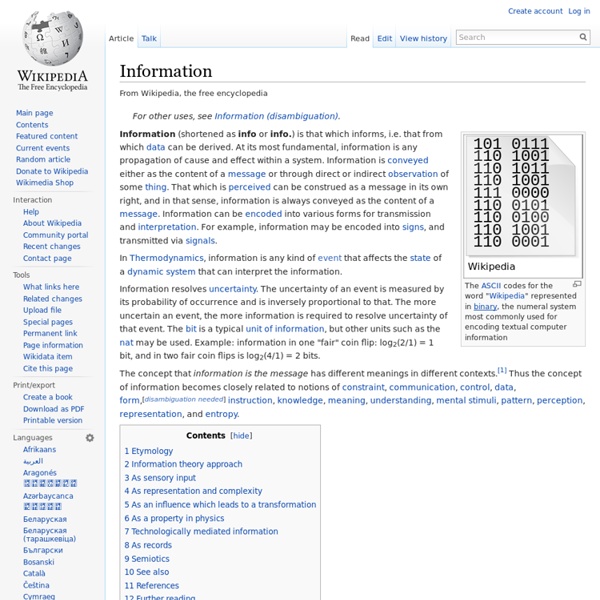Information

http://en.wikipedia.org/wiki/Information
Related: The problems with philosophy
Dancing Makes You Smarter
For centuries, dance manuals and other writings have lauded the health benefits of dancing, usually as physical exercise. More recently we've seen research on further health benefits of dancing, such as stress reduction and increased serotonin level, with its sense of well-being. Most recently we've heard of another benefit: Frequent dancing apparently makes us smarter. A major study added to the growing evidence that stimulating one's mind by dancing can ward off Alzheimer's disease and other dementia, much as physical exercise can keep the body fit. Dancing also increases cognitive acuity at all ages.
List of paradoxes
This is a list of paradoxes, grouped thematically. The grouping is approximate, as paradoxes may fit into more than one category. Because of varying definitions of the term paradox, some of the following are not considered to be paradoxes by everyone. This list collects only scenarios that have been called a paradox by at least one source and have their own article. Although considered paradoxes, some of these are based on fallacious reasoning, or incomplete/faulty analysis.
Science Wars What Scientists Know and How They Know It
the status of scientific knowledge that began in ancient Greece, raged furiously among scientists, social scientists, and humanists during the 1990s, and has re-emerged in today's conflict between science and religion over issues such as evolution. Professor Steven L. Goldman, whose Teaching Company course on Science in the 20th Century was praised by customers as "a scholarly achievement of the highest order" and "excellent in every way," leads you on a quest for the nature of scientific reasoning in this intellectually pathbreaking lecture series, Science Wars: What Scientists Know and How They Know It. Those who have taken Professor Goldman's previous course, which is an intensive survey of the revolution in scientific knowledge from 1900 to 2000, may have wondered: if what counts as scientific knowledge can transform so dramatically within only 100 years, what exactly is scientific knowledge? Science Wars addresses this surprisingly difficult question. What Is Reality?
FUTURE PREDICTIONS CONTRIBUTE YOUR PREDICTION
Related:



